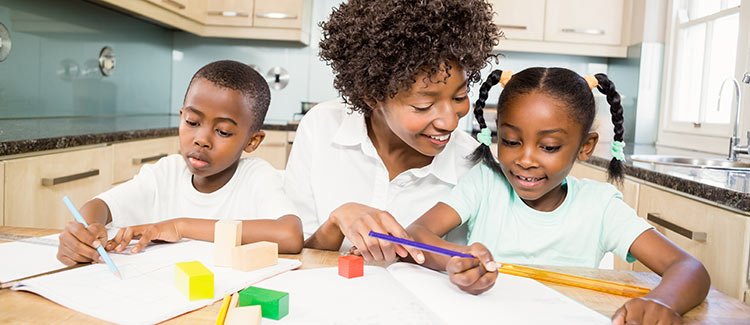Homeschooled kids do better in college.
Homeschool families are all religious.
Homeschooled kids are more creative.
Homeschooled kids lack social skills.
When it comes to homeschooling, there are no lack of strong opinions — as well as misconceptions and prejudices. The truth is that homeschooling has changed dramatically over the past few years. Long considered a radical alternative to traditional schools, homeschooling is rapidly becoming more accepted into the mainstream.
Though homeschools involving strong religion and obsessive spelling bees get a lot of attention, there are plenty of students. The National Home Education Research Institute (NHERI) estimates that 3.15 million students (age 5-18) were homeschooled during the 2021-2022 school year. (The latest National Center for Educational Statistics estimate, from 2016, showed 1.7 million homeschool students, twice as many as there were in 1999.) Fewer than half of families offer religion as the most important reason. Many do it because they want to offer their children the best possible education. More than a few are dissatisfied with their other school options. And of course, homeschooling got a boost during the pandemic, when many schools closed their doors. Black families, especially, saw a surge in homeschooling during the first year of the pandemic. But while experts expect the number of all homeschooled students to decline somewhat as schools have reopened, some parents will find that they like teaching the kids at home, and keep homeschooling as a choice.
Online programs: bringing learning home
Much of homeschooling’s growing popularity is thanks to online programs like K12 or Khan Academy that offer tools, courses, or complete curriculums. Some of these are free resources, but many others can cost hundreds of dollar a year or more. Parents can elect to be hands-on teachers (or hire tutors for specific subjects), sitting down and teaching math and science, working from a printed curriculum. Others might elect to combine homeschooling with some traditional schooling so the student still takes a few courses at a nearby school. Some parents organize groups of homeschool kids to create their own small schools, even turning them into their own charter schools.
Some homeschool parents are less hands-on, believing that — once video games and television are removed — a kid’s natural curiosity will take over and lead her to seek answers thereby getting an excellent, organic education.
What you might find in a home school
- Curiosity, not boredom: With only one or a few students, you have the freedom to approach a subject from the angle that most appeals to those students. Once interested in a topic, students often find their own way to get more information on it. With access to the Internet and a library, a homeschooled student given time to pursue his own interests can easily exceed the knowledge of the average school teacher in a subject he enjoys.
- The entire world: There’s no limit to where — or from whom — your child can learn. Instruction from local artisans or experts, the grocery store, the pool at the YMCA, a patch of garden outside, your kitchen. If you look for them, there are classrooms everywhere.
- Independent kids: Students who learn from a coach who helps them find information rather than a teacher who doles out information in small, testable bundles quickly learn how to learn for the sake of learning — rather than to prove what they know on a test.
- Freedom: Want to teach by doing? You don’t have to secure transportation, permission slips, and space for 30 rowdy students. You can simply get in the car to take a field trip to teach history by touring a museum or city, math by using money or building robots, even earth science and biology through gardening and caring for animals.
- No threat of failure: A child who doesn’t thrive in a traditional classroom can often feel like a failure through no fault of her own. That same child might learn more effectively at a faster or slower pace, with more control over the topics, or in a less chaotic environment.
But how do I homeschool my child?
Plenty of parents might think about homeschooling, but be intimidated by how to go about it: What would I teach? How do I create a curriculum? How do I make sure my child still has friends to play with?
Parents who have successfully homeschooled say that the resources and support system exist in most any town or city to make homeschooling possible for most any family. It’s a matter of knowing what steps to take.
First find out what your state’s rules are. You might have to register your school and detail the curriculum you have chosen. You might also have to provide proof that you have enough education to take this on. You may need to issue end-of-grade tests as well. The rules on this vary from state to state, though homeschooling is legal in all 50 states.
Next, turn to your child. What are her interests? What style of learner is she? Take your time buying an expensive curriculum until you’re sure it suits what she wants to learn and the way you want to teach. You might want to work from a printed-page curriculum and do all the teaching yourself. Or you might opt to be a teacher/coach while your student takes her classes online.
If your child is in middle or high school, you might opt to sign up for a virtual school. Next, find a local support group so you and your child can connect with other homeschoolers in your area. (Find more information about homeschooling, including ideas on finding a support group.) If you work, have small children, and are wondering if you can make homeschooling happen, the answer may be “no” unless you are willing to hire a babysitter or nanny. But if you have a responsible high schooler, you might find a virtual school — complete with teachers — might make it work even if you do have to go to work.
What supporters say
- Learning is for real. When you learn something because you want to know the answer and through real-life experience, you remember it. Those facts your student crammed into his head the night before a test? Not so much.
- Family bonding is sweet. Instead of fighting over homework, attendance, grades, and getting to school on time, you can argue over philosophy, take a day off to go to the park or a museum, feel real pride in your child’s knowledge and abilities, and start your school day at a time that suits your schedule.
- You can travel. Instead of cramming all your vacations and family relaxation time into spring break and summer, travel when it suits you. There is no better way to learn a language, geography, or about different cultures than visiting foreign lands — or touring your own land as a foreigner. Money may limit your adventures but school schedules will not.
- Homeschooling allows you to share your values. You may not like the values your child is bringing home from school. Homeschooling allows parents to raise and educate their children according to their own values and/or religious beliefs. Or the school’s climate may not foster the emotional, social, and academic approach you do. At home, you set the tone.
- Homeschoolers do well academically. According to NHERI, home-educated students typically score 15 to 30 percentile points above public-school students on standardized academic achievement tests. NHERI also claims that homeschoolers score above the average on the SAT and ACT tests.
What critics say
- Homeschooling is for those on the fringe. According to the National Center for Education Statistics, in 2019 only about 13 percent of parents cited the need to provide religious instruction as the most important reason they homeschool. The most important single reason, cited by 25 percent of families, was dissatisfaction with the school environment because of safety, drug use, or negative peer pressure. Most families had more than one reason for choosing the homeschooling route.
- Homeschooled kids are antisocial. There is no doubt that a school with classrooms full of other kids offers more opportunities for social interaction than staying home. But in some schools, those social interactions can be overly negative. This may account for the NHERI research that finds homeschooled kids are doing above average on this measure. But homeschooled kids and their parents do have to look elsewhere for social engagement: clubs, sports teams, and homeschool support groups.
- It’s hard work for parents. If you have three children under ten and decide to homeschool, you will certainly have your hands full for a few years. Even having one teenager at home all the time can wear a parent down — especially if that parent also has a job. Without a doubt, this is a decision to put your child’s education before your own career and free time.
- Homeschoolers don’t do as well academically. While critics say that homeschoolers aren’t getting the quality education they’d receive in a traditional school, statistics on low achievement among homeschoolers is hard to find. (Conversely, student achievement among homeschoolers that is not funded by homeschooling organizations is also hard to come by.) Additionally, there is relatively little regulation for homeschool parents. There are 21 states that require some form of standardized testing. As for being qualified to teach your own kids, most states will allow any parent to home school, although a few require that a parent have at least a high school diploma or GED. Check with your state or the Home School Legal Defense Fund to see if yours is one of them.
Is homeschooling right for my child?
Whether this is the right way to educate your child or not depends on a lot of factors and can change from one year to the next.
If your school is failing your child and you have no other viable options (such as a quality private school), homeschooling might be the best solution. But if your child craves a group to belong to and resides near a friendly public school full of friendly faces, he might do better there. If your school has a bullying problem or your child can’t fit into the social environment, though, socializing there will probably do more harm than good. If you don’t have the time and can’t afford to take the time, then creating a successful home school might put more strain on your family and its finances than they can take. But if you are home and able and want to spend more time with your children, this might be the thing that frees you from some of the strains and difficulties that traditional schooling can present, like homework battles and predetermined vacation days.
A final word of advice about homeschooling
If you decide to leave your child’s existing school and begin homeschooling, do so gently and politely. Tell your child’s school you want to try this and don’t point the finger of blame at the school. If you are reacting to a bad school situation, you may decide in a year that your child wants to go back to that school. Or you might want to ask if your child can attend one class there, be in the school play, or play on a sports team. Don’t burn any bridges. And remember, you aren’t stuck doing this forever any more than you are stuck taking your child to the neighborhood school. You can always change your mind and send the kids back to that school.





